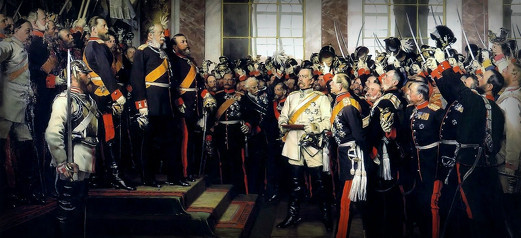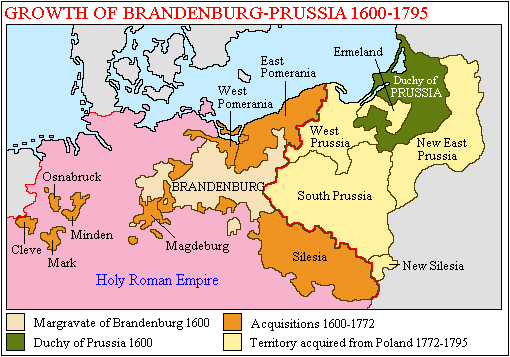Proclamation of Wilhelm Fredrick as German Emperor
From Waterloo to the Marne: The Rise of Prussia
The battlefields of Waterloo and the Marne are separated by a physical distance of approximately 180 miles and by a time span of roughly a century. They mark the defeat of two successive attempts for the mastery of Europe; the first by Napoleon and the second by Kaiser Wilhelm. They frame an era of unprecedented peace, more or less, and economic prosperity on the European continent. A peace and prosperity that world be shattered by the onset of World War I.
In the summer of 1815, on the field of Waterloo, in what is now Belgium, a French army under the command of the former Emperor Napoleon Bonaparte was decisively defeated. The victors were a pan-European force under the overall command of British Field Marshall Arthur Wellesley, the 1st Duke of Wellington, supported by Prussian troops under Marshall Gebhard von Blucher. The defeat ended once and for all Napoleon's ambitions for mastery of Europe.
The peace that followed the Congress of Vienna, the Pax Britannica or the British peace, did not end war on the European continent, but it did buy a measure of stability. By creating a system of checks and balances, backed with Great Britain's money and the powerful Royal Navy, while ostensibly remaining neutral, London insured that no single European power would emerge to dominate the continent and risk another all-out war.
In the words of British Prime Minister, Lord Palmerston, "We have no permanent allies, we have no permanent enemies, we have only permanent interests." Preventing the emergence of a dominant European power was at the core of those permanent interests. For just over a century, Europe was spared the destructive, continent-wide wars that had dominated its politics for almost three centuries previously. The ambitions of would be conquerors, from Phillip II of Spain, to France's Sun King, Louis XIV and finally Napoleon Bonaparte, had been checked for good. Or so it seemed.
The Rise of Prussia,
Prussia, a small German principality on the periphery of Western Europe, was an unlikely candidate to aspire to the mastery of Europe. Located on the north German plain, it was poor, predominantly agricultural, with few natural defenses. To the west and south were a bevy of small German duchies. It was vulnerable, however, to its larger neighbors. These were two formidable powers, Poland to the east and Sweden to the north. Beginning in the eighteenth century, Fredrick William I and then his son Fredrick II began transforming their Prussian kingdom into a major military power.
The ambitions and actions of one man, Otto von Bismarck, would transform Prussia into a German empire stretching from the Rhine in the west to the Oder in the east, and from the Baltic to the foothills of the Alps. As Prime Minister of Prussia, and later as the Chancellor of the German Empire, Bismarck figured large in European politics from the 1860s until his dismissal by Kaiser Wilhelm II in 1890. It was Bismarck who, by intrigue and warfare, succeeded in creating the Empire out of a loose collection of confederated German states.
His first step, in 1866, was to reduce Austria's influence as the most important Germanic state by drawing it into a war over disputed territory in the duchy of Holstein. The seven-week war was fought between the Austrian Empire and its allies in the German Confederation and the Kingdom of Prussia and its German allies. Italy was also allied with Prussia. Italian troops attacked Austria and took control of the province of Venetia (Venice & the Veneto). After some initial setbacks, the Prussian military quickly established its dominance on the battlefield. The result was a shift in power among the German states away from Austria and towards Prussia. The German Confederation was abolished and replaced by the North German Confederation. The latter excluded Austria and the South German states and was dominated by Prussia. Austria also ceded Schleswig, Holstein, Hanover, Hesse, Nassau and Frankfurt to Prussia.
Next, Bismarck turned his attention to the south with the aim of uniting the remaining German states under Prussia. To facilitate this, he engineered a war with France - the Franco-Prussian War of 1870. In 1870 a dispute had arisen between France and Germany over the succession to the Spanish throne. A German prince, a member of the Catholic wing of the Hohenzollern dynasty, had been offered the position. French emperor Napoleon III, already concerned by the growth of German power and influence, feared encirclement between a rising Prussia and a German influenced Spain. He had objected to the German Prince Leopold, and had instructed his ambassador to Prussia to obtain a promise from King Wilhelm I that Prussia would never again support the nomination of a Hohenzollern prince to the Spanish throne. Bismarck arranged for the release of a transcript of the conversation between King Wilhelm I of Prussia and the French ambassador. Bismarck's carefully edited version, the "Ems Telegram," gave the impression that the two men had insulted each other and caused an uproar in both Paris and Berlin.
Napoleon III, pressured by the French press and public opinion, seized upon the telegram as an insult to the French ambassador and his government, and promptly declared war. Forced to choose between France and Prussia, the south German states rallied to Prussia. German military forces proved superior in the field. A series of swift Prussian victories in eastern France culminated in the Battle of Sedan on September 1, during which a large portion of the 120,000 strong French Army of Chalons, along with the French Emperor Napoleon III, were captured. Fighting continued for some five more months, culminating in the siege and subsequent fall of Paris on January 28, 1871.
Hostilities were brought to a close with the Treaty of Frankfurt on May 10, 1871. France agreed to pay reparations of five billion francs, gave Germany the city of Strasbourg and the fortifications of Metz, and relinquished control of the province of Alsace and the northern portion of Lorraine, Moselle. Alsace was home to a majority of ethnic Germans and had been part of the Holy Roman Empire until seized by Louis XIV. Lorraine however was predominantly French. For Germany it was simply taking back a region that was historically a rightful part of the German-speaking world.
For the French, "to the injury of Alsace was added the insult of Lorraine." The "lost provinces" of Alsace-Lorraine became a source of resentment that would poison French-German relations for the next three-quarters of a century, and it would become one of the contributing factors leading to World War I.
Significantly, Bismarck had opposed the annexations, but had finally conceded the point in the face of overwhelming German support for their seizure.
With the South German States now solidly in Prussia's orbit, Bismarck, on January 18, 1871 at the Palace of Versailles just outside Paris, had orchestrated the proclamation of the new German Empire, the Deutsches Kaiserreich. The Reich would be led by the now Emperor, Wilhelm Fredrick, with Berlin as its capital. He had brought into being a new European superpower. The German Empire had the largest population of any European state, was the most industrialized, and boasted an economic output that would soon overtake even that of Great Britain.
Having unified Germany, Bismarck now needed to ensure its stability. This he intended to do by building alliances with key European powers and forestalling the creation of any alliances that might conceivably threaten the German Empire. The "Bismarckian System" that he created proved instrumental in preventing the rise of anti-German alliance for almost a quarter century. Its ultimate collapse would lead to the formation of the pan-European alliances that would ultimately precipitate World War I.


